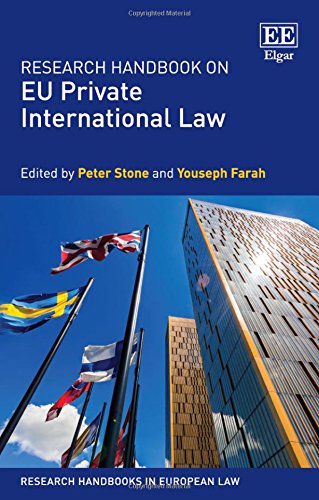

Most ebook files are in PDF format, so you can easily read them using various software such as Foxit Reader or directly on the Google Chrome browser.
Some ebook files are released by publishers in other formats such as .awz, .mobi, .epub, .fb2, etc. You may need to install specific software to read these formats on mobile/PC, such as Calibre.
Please read the tutorial at this link: https://ebookbell.com/faq
We offer FREE conversion to the popular formats you request; however, this may take some time. Therefore, right after payment, please email us, and we will try to provide the service as quickly as possible.
For some exceptional file formats or broken links (if any), please refrain from opening any disputes. Instead, email us first, and we will try to assist within a maximum of 6 hours.
EbookBell Team

4.7
36 reviews'This book offers a very timely and exquisite insight into some of the most pressing challenges of EU private international law - itself an area of the law with growing impact on practice, academia, and the further development of EU law generally. Peter Stone and Youseph Farah have gathered a steller team of commentators to guide the reader through some of the intricate mazes of EU conflicts law. A delight.'
- Geert van Calster, University of Leuven, Belgium
The harmonization of private international law in Europe has advanced rapidly since the entry into force of the Treaty of Amsterdam. Most aspects of private international law are now governed or at least affected by EU legislation, and there is a substantial and growing body of case-law from the European Court as well as the courts of the Member States. This timely Handbook addresses key questions and problems that currently exist in the rules of private international law laid down by European Union regulations.
Bringing together perspectives from both civil law and common law traditions, the book mainly considers issues relating to the Brussels I Regulation on civil jurisdiction and judgments, and to the Rome I and II Regulations on choice of law in respect of contractual or non-contractual obligations. Weaknesses in the current law are identified, and suggestions are made for possible improvements. The expert contributors focus on currently relevant problems including some issues which have tended to be neglected.
Academics, law students and public officials interested in private international law will find this Handbook to be a valuable resource. Both practising lawyers and commercial lobbyists will also find many useful insights.
Contributors include: O. Bamodu, I. Carr, Y. Farah, G. Güneysu-Güngör, L. Heffernan, S. Hourani, D. Kenny, M. Koutsias, X.E. Kramer, P. Stone, E. Treppoz, A. Yilmaz-Vastardis, H.-L. Yu